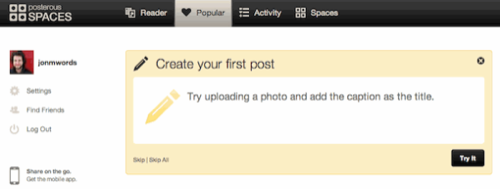Posterous, the niftiest self-publishing platform you’ve never used, just rolled out a whole new metaphor for the service called Posterous Spaces. What Posterous – and any other apparent blogging service, for that matter – used to call ‘sites’ are now called spaces. Spaces allow you to publish content to selected audiences. That’s right; Posterous Spaces are no longer to be thought of as simply “blogs” or what-have-you. They’re gunning for Google Plus and Facebook now.

The Posterous iPhone app has been updated to incorporate spaces, but the announcement doesn’t mention the Android app. Posterous has also improved ways of finding and following spaces, adding a ‘Popular’ tab for real-time highlights from around Posterous and an ‘Activity’ tab showing likes, comments, follows and such from your spaces and those you follow.

Posterous Reborn
We used to think of Posterous as a light blogging service, and it wasn’t clear how it distinguished itself from its competitors. Sure, it had nifty little features like custom domains and built-in Markdown support, but these weren’t features for everyday users. Tumblr, the clearest competitor, began to leave Posterous in the dust. But after today’s left turn, it’s not even clear Posterous and Tumblr are in the same game anymore.
Spaces. Sounds familiar, doesn’t it?
So, why share to your social circles using Posterous instead of Facebook or Google Plus? Well, does Facebook or Plus let you choose your own theme for each friend list or circle? Posterous does. Can each Facebook friend list or Google Plus circle have its own custom Web address? Not without more trouble than it’s worth. Posterous has issued a challenge to the “silo” model. It lets you share the right stuff with the right people in the way that suits you best.
Posterous Users, Rest Assured
In the announcement, the change is described as a “brand new service for the Web, iPhone and Android that replaces the current service.” That sounds drastic, and existing users could be forgiven for feeling a bit unnerved, but as it turns out, existing Posterous sites will survive the transition to Spaces just fine.
Clearly, while we’ve all been watching all the big Tumblr and WordPress news, the Posterous team has been busy in the kitchen.
What Exactly Is Blogging, Anyway?
WordPress and Tumblr are showing great usage numbers, and maybe that’s why their competitors are moving to distinguish themselves. Blogger, Google’s popular blogging platform, may be rolled into Google Plus in some way, and Google’s social network is itself a fairly compelling publishing platform for medium-length posts. New startups like Jux are taking what might be called a “maximalist” approach to blogging, turning it into a bombastic, full-screen experience. Posterous, for its part, seems to be hanging onto its focus on simplicity and usability.
Which publishing tools do you like best? Let’s discuss in the comments.

















